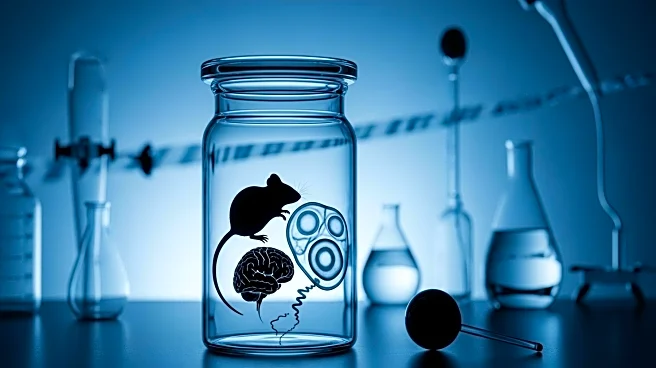What's Happening?
Chinese researchers have successfully transplanted human brain cells into mice, leading to significant changes in the animals' mood and behavior. This study, conducted by the Chinese Academy of Sciences at Fudan University in collaboration with UniXell Biotechnology, involved engineering dopamine-producing neurons and integrating them into the mouse brain. The transplanted neurons showed promise in alleviating symptoms associated with major depressive disorder by repairing dopamine pathways. The research team tested these neurons on mice subjected to chronic stress, a condition that mirrors depression in humans, and observed antidepressant-like behaviors post-transplantation. The study suggests that cell therapy could be a viable alternative to traditional pharmaceuticals for treating psychiatric disorders.
Why It's Important?
This research highlights the potential of cell-based therapies to revolutionize psychiatric treatment by directly targeting malfunctioning neural circuits. Traditional antidepressants often fail, especially in cases of treatment-resistant depression, making this approach a promising alternative. The ability to repair impaired dopamine circuits could alleviate persistent symptoms like anhedonia, offering a more refined treatment option. However, ethical considerations and physiological differences between mice and humans pose challenges for applying this therapy to humans. The study underscores the importance of animal models in advancing mental health research, despite the ongoing debate over the use of human cells in animal research.
What's Next?
The research team aims to refine these techniques and conduct further studies to ensure safety and efficacy in humans. As the field of neuroscience advances, these innovations could pave the way for personalized and precise treatment options for various mental health disorders. Researchers hope to address the challenges posed by differences in metabolism, immune response, and lifespan between mice and humans. The study's encouraging results highlight the potential of cell-based therapies to transform psychiatric treatment, with further exploration needed to translate these findings into human applications.
Beyond the Headlines
The transplantation of human-derived dopamine neurons into mice demonstrates how precise cell therapy could lead to novel treatments for challenging psychiatric conditions. This approach may offer a more targeted and effective solution than current pharmacological treatments, which often come with a range of side effects. The journey from animal models to human application is complex, but the potential implications for mental health treatment are significant. As researchers continue to explore the possibilities of cell-based therapies, the hope is that these innovations will lead to more effective and personalized treatment options for individuals suffering from psychiatric disorders.










